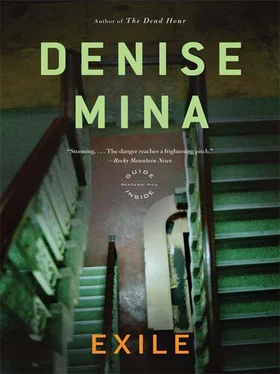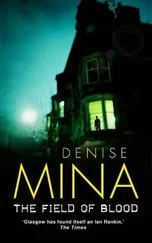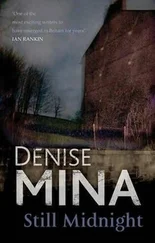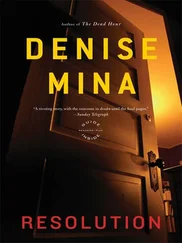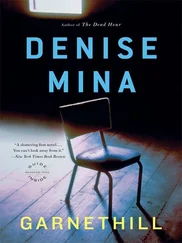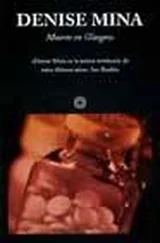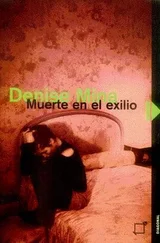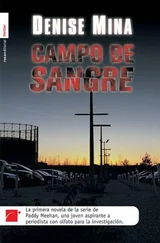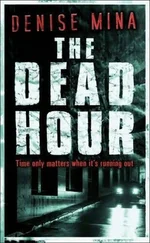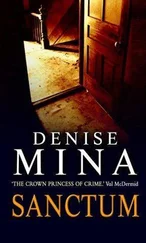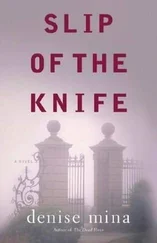Jimmy lifted the mug and sipped, looking up at her as he sat down.
"Jimmy, why does Ann owe so much money?"
"Come on." He smiled. "Come on, we'll not talk about her."
Jimmy didn't want to talk about kids or Ann or money. He wanted a quick, fumbled fuck with anyone willing and a ten-minute pause in the incessant worry. He held out his hand to her and bared his sharp hunting teeth. Maureen pulled her coat closed. "I want to talk about her," she said quietly. "That's why I came."
Long acclimatized to disappointment, Jimmy let his outstretched hand fall to the side of the chair. "She borrowed money for drink," he said finally. "Then she borrowed to pay the loan and it got worse and worse and worse. Ann's not a bad woman. It's the drink. She's different when she's not drinking. When she drinks she's a cunt."
"Ye don't think she could be dead, do ye?"
"I know she's not. She cashed the child-benefit book on Thursday."
"In Glasgow?"
"Dunno." Jimmy sipped his tea despondently. "They don't tell ye that at the post office, just that it's been cashed and I can't get it."
"Do you think she'll come back here?"
Jimmy shook his head into his chest. "She's not coming back." He sipped the tea, tipping the mug back and grimacing.
"D'ye know where she is?"
"She's got a sister in London. Maybe she knows."
"Could I phone her?"
"I dunno if she's on the phone."
"What's her name?"
"Moe Akitza."
Maureen wrote the sister's name on a receipt from her pocket and showed Jimmy the spelling. "I think that's right." He smiled at her. "Mad name, eh? She married a big darkie."
She knew if she pressed him he'd claim not to be prejudiced against anyone, except those grasping Pakis, of course. And the freeloading Indians. And the arrogant English. And the drunken Irish. And the suspiciously swarthy. "Well, Jimmy, thanks very much. It was kind of ye to talk to me."
"Aye," he said. "Well, I'm pressed as ye can see."
They smiled at each other to pass the time. Maureen broke it off. "Ye really don't know where she is, do ye?"
He looked into his empty mug and shook his head.
"D'ye miss her?" she asked.
Jimmy didn't need time to think about it. "No," he said, very sure and very sad.
Behind her the front door flew open, letting a cold slap of night air into the living room. Two wee boys with wet hair and filthy faces strolled into the room, their arms at forty-five-degree angles to their small bodies, strutting like miniature hard men. Their clothes were poor, even for scheme kids. Everything they were wearing had approximated to a dull gray color, the result of over-washing in cheap soap. Jimmy warmed and smiled when he saw them and his boys grinned back. "All right, Da?" said the older one. "Where's our tea?"
Jimmy cupped a gentle hand around the back of the bigger boy's head and swept him along into the dark kitchen. The younger one stayed in the living room and looked up at Maureen. He was the boy from the Polaroid photo, the boy holding the hand of the big man in the camel-hair coat, but he looked different close up: he had a little widow's peak, his eyelashes were thick and long.
He looked at her expensive overcoat. "Are ye a social worker?" he asked, in a tiny voice.
"No, I'm a pal of your mum's."
His face lit up. "Mammy? 'S Mammy coming home?"
"No, John," Jimmy shouted. "The lady's just looking for her."
Maureen looked into the kitchen. Jimmy was standing in the shadowy kitchen with his son, spreading cheap margarine on Supersavers white bread. She turned her back to the kitchen door, hoping Jimmy wouldn't hear her. "Son, did you get your picture taken with a man at school recently? In the playground with a big man with short hair?"
The boy nodded.
"Who was the man?"
The boy licked at the snotters on his top lip with a deft tongue. "It was picture for Mammy," he said quietly, as if he didn't want Jimmy to hear either.
"Was your mum there?"
"Naw."
"Who took the picture?"
" 'Nother man."
"And did ye know that man?"
"Nut."
"Have ye seen your mammy since your brother's birthday?"
"Nut."
"Thanks, son," she said, and it struck her how small he was, how thin his skin was, how it was a quarter to ten at night and he was six and had just come in from playing in the street with his brother. She wanted to wrap him in her good coat and make him warm and take him away and feed him nice food and read to him and give him the chance of a life. She wanted to cry. The wee boy sensed her pity and knew she was sorry for him, for the state he was in and for his future. He frowned at the floor. She hated herself. "You're a good boy," she said, and stood up, ruffling his hair like a patronizing idiot. She cleared her throat and called into the kitchen, "I'm away, then, Jimmy."
Jimmy didn't turn to see her go. "Aye," he said.
"I'll come and see ye if I find her."
"Don't," said Jimmy flatly, folding a slice of bread into a sandwich. "Don't come."
A scratched message on the back of the lift doors informed the world that AMcG sucked cocks. Maureen was glad to get out of the smelly lobby, glad to be away from Jimmy and his malnourished kids, eager to forget what she had seen. It was hard to look on poverty so all-pervasive that it even extended to his speech. She worked through the normalizing justifications: maybe Jimmy was lazy and deserved it; maybe he liked it – lots of people were poorer than him. But she had eight thousand pounds in her bank account and he had four kids and no kettle and she couldn't think of a single thing that made that all right. She felt her father following her across the yard to the street, his glassy eyes watching from every dark corner. Her muscles tensed suddenly and she broke into a run. Jimmy was right. Wherever Ann was she wouldn't come back here.
FIGHT NIGHT
Jimmy Harris couldn't hit a tambourine." Maureen took a deep drink of her whiskey and lime and felt the thin skin inside her top lip shrivel in the concentrated solution. "Someone else must have beat her up."
Leslie was sitting across the table picking at the picture on a sodden beer mat. They were in the Grove, a small pub below a block of tenements. It had been the bottom flat at one time and the layout was still discernible. The supporting walls had been knocked down and riveted cast-iron pillars stood in their place. The lights were bright and two large televisions flickered silently at either end of the fifteen-foot bar. The pub attracted a good-natured crowd of regulars – they milled around the room, talking and laughing, watching the horse racing with one eye while they chatted to their pals. Leslie had been thinking about what Maureen had said to her in the Driftwood and had worked herself into a filthy mood. Maureen thought Cammy would be waiting for her at home and Leslie would be anxious to get back before the boil on his neck exploded.
"What did he say?" Leslie asked casually, as if she didn't really care, but Maureen could feel her fishing for something, something too private and precious to share with her.
"Nothing much." She shrugged. "Ann owes money to loan sharks and he doesn't think she'll ever come back. She's taken the child-benefit book and it's being cashed consistently."
Leslie sat up. "Is it?"
"Aye."
Leslie thought about it. "Does that mean she's cashing it?"
"Dunno. When did Ann turn up at the shelter?"
"December ninth," said Leslie, without having to think about it. "Why?"
"There's about a month-long gap between her leaving Jimmy and coming to us. She was up and down to London, seemingly."
"Who says?"
"He says."
"Aye." Leslie was skeptical. "Why would you believe anything that bastard says?"
Читать дальше
